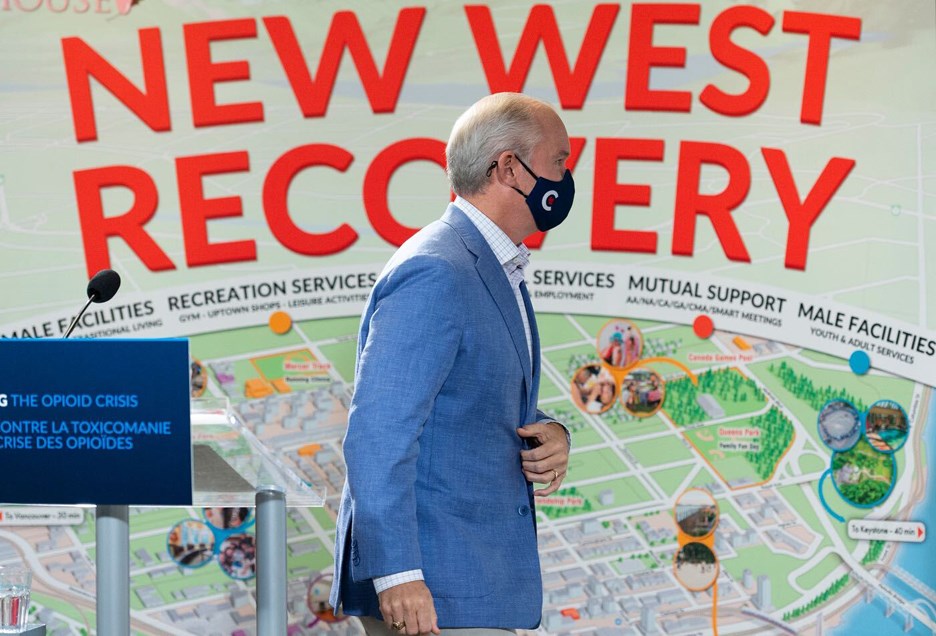A Conservative government would continue to allow supervised consumption sites even as it would shift away from harm reduction and toward recovery, federal party leader Erin O'Toole said in New Westminster on Sunday.
The more progressive approach marks a change from the last Tory government's moves to block the sites, but appears to draw the line at decriminalization.
O'Toole stopped short of a pledge to exempt possession of small amounts of illicit drugs from Criminal Code provisions, a request made to Health Canada by both the city of Vancouver and the province of British Columbia.
"We want recovery and treatment to be at the core of a national program that recognizes harm reduction," O'Toole said Sunday at a campaign stop at the Last Door Recovery Centre in New Westminster.
"People with addiction should not be the focus of the criminal justice system. People that are dealing and that are preying on people with addiction should be the focus," he said.
Asked whether that view should be etched into federal policy by decriminalizing simple possession, O'Toole stressed "judicial discretion" grounded in compassion.
"I don't think someone with an addiction should be punished. I think they should be helped," he said.
The fresh Conservative stance emerged at an addiction recovery centre, where O'Toole said he will approach Canada's opioid epidemic as an "urgent health crisis" rather than a criminal scourge.
The Tory election platform would invest $325 million over the next three years to create 1,000 residential drug treatment beds and build 50 recovery centres across the country.
O'Toole has also pledged to enhance treatment and prevention services in First Nations communities and partner with the provinces to provide free overdose-reversing Naloxone kits.
Health Canada is currently working with Vancouver on the city’s request for exemption from criminal provisions on simple possession of small quantities of drugs.
Vancouver has been the epicentre of an opioid crisis that saw B.C. record 1,176 illicit drug overdose deaths in 2020 — the highest ever in a single year — and more than 7,000 deaths since a public health emergency was declared in April 2016.
The Liberals aimed to cast doubt on the new, friendlier face the Tories are presenting on addiction.
"The Conservatives’ record is one of banning safe consumption sites and fighting them in court. The Conservatives’ record is one of punishing Canadians battling addiction," Liberal party spokesman Thierry Bélair said in an email.
Former prime minister Stephen Harper's government fought the expansion of safe injection sites, passing legislation in 2015 that tightened criteria for groups seeking a Health Canada exemption — required under the Controlled Drugs and Substances Act to establish a new site.
Peter Julian, the New Democrat candidate for New Westminster-Burnaby, said the NDP has been "crystal clear" on its support for decriminalization of simple possession.
"He doesn't seem to be very clear on that," Julian said of O'Toole, minutes after crossing paths with him outside the Last Door recovery centre and encouraging him to "keep up your energy." They both agreed the election set for Sept. 20 was "very irresponsible," in Julian's words.
In the short term, the federal government should declare the opioid crisis a public health emergency and address safe supply, he said.
Ottawa also needs to "take on Big Pharma" by launching an investigation into the opioid epidemic and seeking compensation for its victims.
"Seventeen Canadians die every day as a result of this crisis," Julian said. "Without those two measures, it's window dressing."
Jared Nilsson, executive director of Last Door, which provides residential recovery services for male users, said recovery comprises one facet of a comprehensive approach to addictions.
"The problem with just decriminalization is you keep people just stuck where they are," he said. "You can't just have decrim, you have to have a full model done: treatment, recovery, consumption sites, harm reduction."
Chris Esnard, a 49-year-old father of three who has lived at Last Door since 2019, said the recovery centre has been critical to getting his life back on track amid a debilitating cocaine addiction.
"The biggest piece was connection," he said. "Journaling every day and hanging out with the guys.
"You get to a point where you're just lost, like you don't even realize what you're doing and how you're doing it — it's five o'clock in the morning, driving to find some," said the former food service worker.
"You can put as many police as you want on the street. If I want to find my drugs, I'll find them."
Garth Mullins, a representative of the Vancouver Area Network of Drug Users (VANDU), said the Tory approach marks an improvement from Harper’s tough-on-crime stance, but he believes a focus on recovery and abstinence is "misplaced" as it misidentifies the crux of the crisis.
"That always sort of says, 'We want to do this instead of worrying about people's lives," Mullins said, stressing safe supply and expressing skepticism in the new promises.
"They may slightly nicer things in their policy, but Conservatives in action just want to come down hard on drug users," he said.
Canada's 39 supervised consumption sites — where users can inject or inhale pre-obtained drugs under the supervision of trained staff — saw 3,000 visits per day between 2017 and 2019, amounting to about two million visits in total, according to Health Canada.
The vast majority of those sites have opened since Justin Trudeau's government took power in 2015, Bélair noted.
In February, the Liberals tabled a bill to repeal mandatory minimum penalties for certain drug offences, but it died on the order paper after Trudeau triggered an election.



